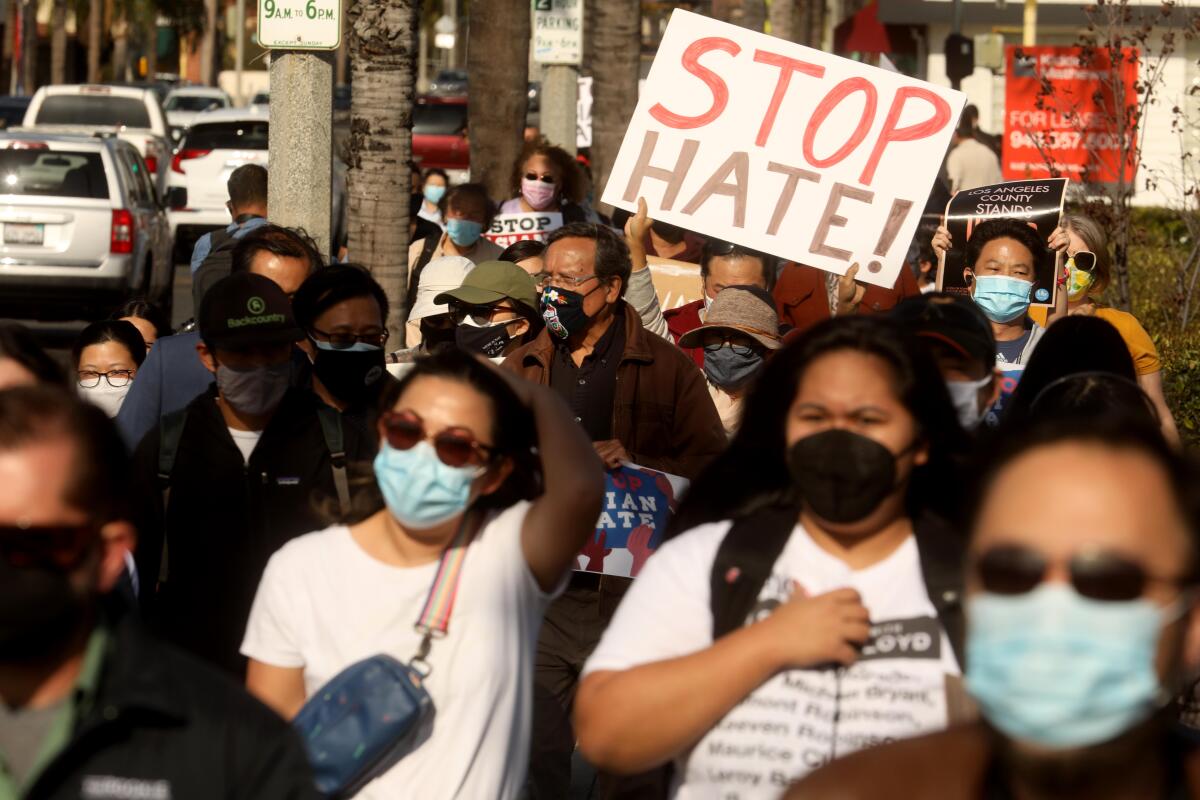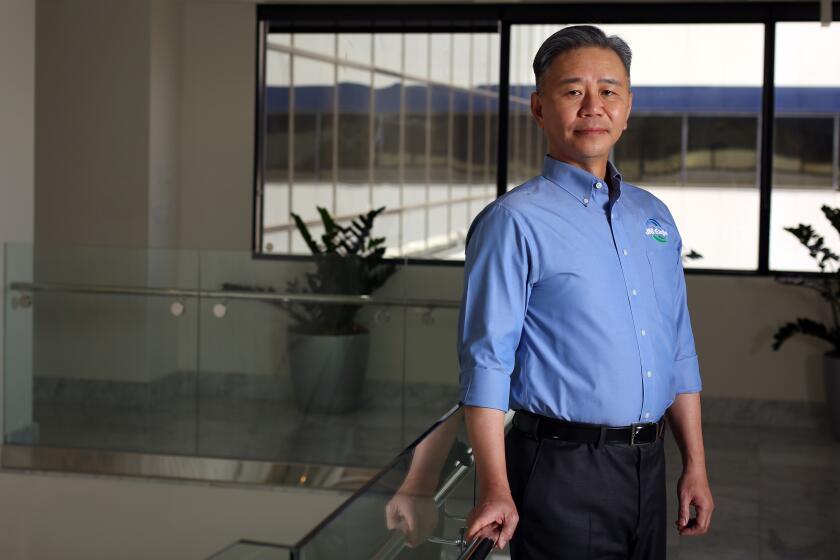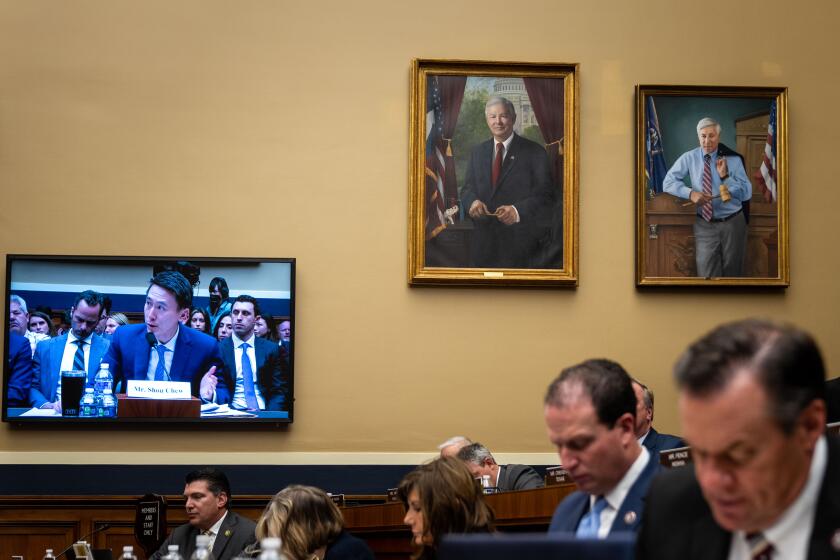Opinion: Why my Taiwanese American identity has become more complicated

- Share via
When I was young, I visited Taiwan every summer. I spoke Taiwanese at home, and we often ate Taiwanese food at home. My parents emphasized that they were from Taiwan and that we were a Taiwanese family with roots that extended several generations on the island, to before Chiang Kai-shek fled there in 1949.
Indeed, my identity as a child was very much as a Taiwanese American. Having a distinct name of clearly Asian origin only reinforced that. And while no one in North Carolina (where I was born and lived for the first six years of my life) could pronounce my name, being Taiwanese American wasn’t so unusual once we moved to Rowland Heights, a suburb in the San Gabriel Valley, where many could trace their heritage to Taiwan.
But as I got older and went from middle school to high school, I became less wedded to my Taiwanese identity. For ease, I even began to tell people I was Chinese, since some I encountered would confuse Taiwan with Thailand. I then went to college, met classmates who embraced their Asianness and was introduced to pan-Asian ethnic affiliations and organizations. Whether I was Taiwanese or Chinese didn’t seem to matter so much. We were all Asian Americans who were developing our own identities separate and apart from whatever our specific heritage or ethnicity was.
The Daily Caller, co-founded by Fox News’ Tucker Carlson, has accused local businessmen of having ties to China’s Communist Party, with little evidence.
Over the last few years, however, I’ve become a lot more conscious of my identity as a Taiwanese American. But not for the same reasons as when I was young. Instead, it’s because being perceived as Chinese in America has become so much more challenging with the sharp increase in geopolitical tensions between the U.S. and China. Former President Trump then made matters worse by calling COVID-19 the “China virus” or the “kung flu” and maligning his own secretary of Transportation, Elaine Chao, because of her heritage. Ironically, though, many older Taiwanese Americans supported Trump because of the skepticism he expressed toward China and the policy steps he took to bring the U.S. and Taiwan closer.
The challenge was heightened when I entered the public arena last year as a candidate for California state controller. During that campaign, I consistently self-identified as Taiwanese American and emphasized my negative impressions of the Chinese Communist Party, how it governs China, and the constant threat it poses to Taiwan. These have long been my views, but my emphasis of them was certainly influenced by the environment we find ourselves in today.
Still, I have found it difficult to watch how some Americans of both Chinese and Taiwanese descent have had their loyalties called into question or been deemed somehow “un-American” because of business, cultural or personal ties to China. Regardless of the significant contributions they have made to the communities they live in, these colleagues and friends have been subjected to innuendo, assumptions and unsubstantiated narratives. In some cases, these attacks have come in very public forums.
Of course, we should not dismiss some of the broader concerns about the Chinese government’s efforts to ramp up its influence activities in the U.S. Unfortunately, no sector of American society — business, academia, politics and beyond — is immune from the CCP’s efforts to shape opinion here.
The U.S. has seen surges of this kind of racism before. Here’s what’s behind the latest.
Because of this, Americans of Chinese descent can feel pressure to prove that they are more loyal to our country. But the latest examples of such activity have not even involved people of Chinese descent. A former Harvard professor, Charles Lieber, was sentenced last week for making false statements to federal agents and failing to declare money he received as part of a contract with a Chinese university. And last week, former Fugees rapper Prakazrel Michel was convicted in a federal case that included accusations of trying to influence U.S. officials on behalf of the Chinese government. These recent cases show that ethnic identity or heritage isn’t a proxy for patriotism.
As a Taiwanese American, I don’t believe the current Chinese government is particularly interested in improving relations with the United States. At the same time, I take pride in the strong friendships I have with Chinese Americans who don’t shy away from their heritage and connections to China as a society, not a government. I’ll continue to participate in organizations and endeavors that honor and celebrate the many contributions that Americans of Chinese descent have made to creating a more perfect union.
I’ve come full circle when it comes to my own Taiwanese identity. And while there surely are differences between those who are Taiwanese and those who are Chinese, one thing is for certain: As Americans, we share one fate, and we’re better together than we are apart.
Lanhee J. Chen is a fellow in American public policy studies at the Hoover Institution and the director of domestic policy studies at Stanford University. He was a candidate for California state controller in 2022.
More to Read
A cure for the common opinion
Get thought-provoking perspectives with our weekly newsletter.
You may occasionally receive promotional content from the Los Angeles Times.












